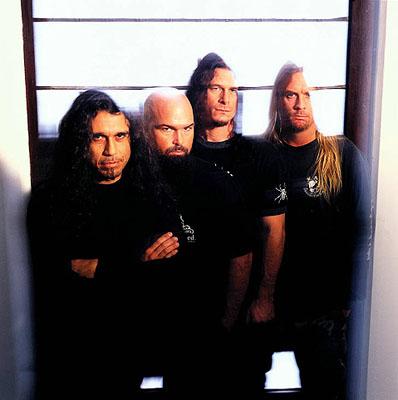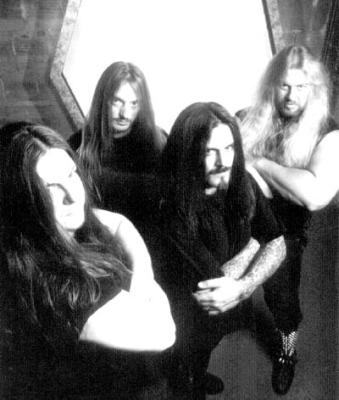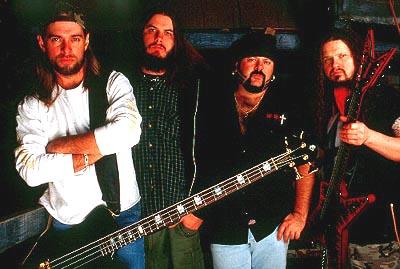 | Metallica The most consistently innovative metal band of the late 80s and 90s was formed in 1981 in California, USA, by Lars Ulrich (b. 26 December 1963, Copenhagen, Denmark; drums) and James Alan Hetfield (b. 3 August 1963, USA; guitar/vocals) after each separately advertised for fellow musicians in the classified section of American publication The Recycler. They recorded their first demo, No Life Til' Leather, with Lloyd Grand (guitar), who was replaced in January 1982 by David Mustaine (b. 13 September 1961, La Mesa, California, USA), whose relationship with Ulrich and Hetfield proved unsatisfactory. Jef Warner (guitar) and Ron McGovney (bass) each had a brief tenure with the band. At the end of 1982 Clifford Lee Burton (b. 10 February 1962, USA, d. 27 September 1986; bass, ex-Trauma) joined the band, playing his first live performance on 5 March 1983. Mustaine departed to form Megadeth and was replaced by Kirk Hammett (b. 18 November 1962, San Francisco, California, USA; guitar). Hammett, who came to the attention of Ulrich and Hetfield while playing with rock band Exodus, played his first concert with Metallica on 16 April 1983. The Ulrich, Hetfield, Burton and Hammett combination endured until disaster struck the band in the small hours of 27 September 1986, when Metallica's tour bus overturned in Sweden, killing Cliff Burton. During those four years, the band put thrash metal on the map with the aggression and exuberance of their debut, Kill 'Em All, the album sleeve of which bore the legend "Bang that head that doesn't bang". This served as a template for a whole new breed of metal, though the originators themselves were quick to dispense with their own rule book. Touring with New Wave Of British Heavy Metal bands Raven and Venom followed, while Music For Nations signed them for European distribution. Although Ride The Lightning was not without distinction, notably on "For Whom The Bell Tolls", it was 1986's Master Of Puppets that offered further evidence of Metallica's appetite for the epic. Their first album for Elektra Records in the USA (who had also re-released its predecessor), this was a taut, multi-faceted collection that both raged and lamented with equal conviction. After the death of Burton, the band elected to continue, the remaining three members recruiting Jason Newsted (b. 4 March 1963; bass) of Flotsam And Jetsam. Newsted played his first concert with the band on 8 November 1986. The original partnership of Ulrich and Hetfield, however, remained responsible for Metallica's lyrics and musical direction. The new line-up's first recording together was The .98 EP - Garage Days Re-Revisited - a collection of cover versions including material from Budgie, Diamond Head, Killing Joke and the Misfits, which also served as a neat summation of the band's influences to date. Sessions for ... And Justice For All initially began with Guns N'Roses producer Mike Clink at the helm. A long and densely constructed effort, this 1988 opus included an appropriately singular spectacular moment in "One" (a US Top 40/UK Top 20 single), while elsewhere the barrage of riffs somewhat obscured the usual Metallica artistry. The songs on 1991's US/UK chart-topper Metallica continued to deal with large themes - justice and retribution, insanity, war, religion and relationships. Compared to Kill 'Em All nearly a decade previously, however, the band had grown from iconoclastic chaos to thoughtful harmony, hallmarked by sudden and unexpected changes of mood and tempo. The MTV -friendly "Enter Sandman" broke the band on a stadium level and entered the US Top 20. The single also reached the UK Top 10, as did another album track, "Nothing Else Matters". Constant touring in the wake of the album ensued, along with a regular itinerary of awards ceremonies. There could surely be no more deserving recipients, Metallica having dragged mainstream metal, not so much kicking and screaming as whining and complaining, into a bright new dawn when artistic redundancy seemed inevitable. Metallica was certified as having sold nine million copies in the USA by June 1996, and one month later Load entered the US charts at number 1. The album marked a change in image for the band, who began to court the alternative rock audience. The following year's Reload collected together more tracks recorded at the Load sessions, and featured 60s icon Marianne Faithfull on the first single to be released from the album, "The Memory Remains". Garage Inc. collected assorted cover versions, and broke the band's run of US number 1 albums when it debuted at number 2 in December 1998. The following year's S&M, recorded live with the San Francisco Symphony Orchestra, evoked the worst excesses of heavy rock icons Deep Purple. In January 2001, Newsted announced he was leaving after almost fifteen years service with the band Slayer  Coming from anyone else, this might sound like an idle boast. When guitarist Kerry King of Slayer says it; its a simple statement of fact. Almost 20 years after Slayer first started blending the heavy riffs of metal with the anger and violence of punk, the next chapter in the Slayer story will be written with the release of GOD HATES US ALL.
Its been three years since Slayer last released a record, 1998's DIABOLUS IN MUSICA, but its not like the guys have been lounging around poolside, sipping mai-tais and waiting for the royalty checks to roll in. "We started working on this record after we got done with a long touring cycle, but prior to Ozzfest '99," says guitarist Jeff Hanneman. "And like every three or four months, something would come up to sidetrack us so we couldnt finish it. Wed have to take a break and learn stuff for Ozzfest and come back, work for a few months, go in and do a WCW song for a month (Here Comes The Pain), go out on the Tattoo the Earth tour, last summer. Then we'd work for a few more months until we were asked to do a song - Bloodline for the Dracula 2000 soundtrack, and that was the last break. Then we got our shit together, went up to Vancouver and made a record."
Recorded at The Warehouse, a Vancouver studio owned by Bryan Adams, certain alterations had to be made in converting Slayers new environs from a studio owned by a lightweight Canadian pop singer to something suitable for four men recording a 12-14-song album titled GOD HATES US ALL. Slight alterations, like a chalked-out crime-scene-style drawing of a body on the floor. Candles. Dimmed lights. Incense. Porn-covered walls. All the little amenities that make a house a home.
"We had two banner flags that were of middle fingers," says singer/bassist Tom Araya. "As you walked into the first door of the studio, there was a Misfits skull that said, Eat a bag. The next door you opened, there was a white flag with a middle finger pointed up right in your face. You'd open the door to the mixing room, theres another middle finger. That was basically the attitude of Slayer in the studio. We had a red devil head on one of the speakers. We had a skull on another. Thats the kind of shit we put up. Spooky stuff that makes you feel at home."
Slayer picked Matt Hyde to produce GOD HATES US ALL, after his stellar work on Bloodline for the Dracula 2000 soundtrack. "He had a handle on every aspect of the recording. He likes the band, he likes the music," says King. "He knew what we were trying to achieve, rather than just us telling him. He knew what was going on. I tell people he's God, might as well bring in the cross and nail him up to it because hes the fucking best."
As intense a record as Slayer has recorded, God Hates Us All found King and Hanneman stripping the songwriting down to the essentials, trimming the fat and keeping the fury. "I didnt write the usual Dungeons and Dragons shit, looking in the synonym finder for words I have no idea what they mean anyway, " King says by way of explanation. "This is a lot more how I talk, a lot more street. A lot of the topics are things people can relate to and theyll hear the street-style version, so I think theyll get more out of it."
Youd have to be deaf, dumb or dead to miss the message of songs like Threshold or Exile, which crackle with the unchecked wrath Slayer, fans have come to count on. Threshold is about reaching your limit in any given aspect, with a person in a situation where youre about to break. You're about to blow-up," says King. Exile is pretty much about a person - everybody's got one - who is like the anti-them -- you just hate with every ounce of your fucking being. Its called Exile because you want them away from you. You want to kill yourself so you don't have to deal with them anymore."
King and Hanneman toyed with new guitar tunings on the album, taking the plunge down to Drop B a couple times and hauling out a seven-string axe for the first time in Slayer history. "A lot of people you see in Guitar World say, "I'm not Steve Vai, I have no reason to play a seven-string," says King. "That's like telling a drummer to play a single kick drum, trying to tell him he doesn't need a double-bass kick. It doesn't make sense. Or they cop out saying, I'm not that good. You dont have to be good to make up a seven-string riff."
Slayer records begin with the drums, and Paul Bostaph, timekeeper for half of Slayer's nearly 20 years as a band, says there's a simple rule he follows in setting the brutal pace. "Rick Rubin once said the perfect take is the one that felt like it was going to fall apart but never did. I thought that was one of the wisest things Ive ever heard and I always try to go for that."
During breaks from recording, Slayer hits the town, patronizing local bars like the Shark Club and the Cobalt Club and watching nearly every hockey game the hometown Vancouver Canucks played. Singer Tom Araya spent his off-hours reading true crime novels with cheery titles along the lines of "Happy Like Murderers" to help him inhabit the minds of murderous priests (God Send Death) and a fallen angel pushing drugs (Cast Down). "I use those books to spark my imagination, to go into the role playing that I need in order to sound convincing. I need to sing and make it sound like I'm actually going to do these things I'm saying. They help out a lot with the screaming."
Let other bands break-up, try to "find their sound" or record albums with symphonies. In the fickle, ever-changing world of music, Slayer remains a sure thing.
"I think I'm a fan first and foremost," says King. "The difference between me and the people watching our show is that I learned how to play guitar. For some reason, I know how to make up riffs for Slayer and I get the opportunity to do that, so I'm like the superfan. Its what I'm into. If I was going to start a new band today, Id want it to be just like this one
Morbid Angel Formed in Florida, USA, in 1984, the band's original line-up consisted of Stering Von Scarborough (bass, vocals), Trey Azagthoth (guitar), Richard Brunelle (guitar) and Pete Sandoval (drums). They quickly gained a following on the underground death metal scene on account of their extreme, ultra-fast musical approach. The band recorded the self-financed Abominations Of Desolation in 1986. However, unhappy with the recordings, they decided not to release them, as had originally been intended, on their own Gorque Records label. They then underwent a personnel change, replacing the departed Scarborough with David Vincent (ex- Terrorizer ), who gave the band much more of an identity with his strong, charismatic presence (he had previously produced Abominations Of Desolation ). Morbid Angel continued to gain momentum and eventually attracted the attention of Earache Records, resulting in the band's official debut, Altars Of Madness, released in 1989, to great acclaim among death metal fans. By the release of Blessed Are The Sick, they had toured Europe extensively, establishing a strong following in the process. The album, like its forerunner, produced by Tom Morris, was once again a marked improvement on previous efforts, and strengthened their position within a growing fanbase. Owing to widespread bootlegging and the band's burgeoning popularity, Earache Records released the original recordings of Abominations Of Desolation in 1991. For 1993's Covenant, released through Giant/ Warner in the USA, Flemming Rassmussen ( Metallica, etc.) was drafted in to produce, and their rising profile was cemented by a US tour supporting Black Sabbath and Motrhead. 1994 saw the replacement of Richard Brunelle by Eric Rutan (ex-Ripping Corpse). His arrival seemed to revitalize Morbid Angel and 1995's Domination was a much more varied selection. While still undoubtedly death metal, songs such as "Dawn Of The Agony" and "Dreaming' touched on both classical and industrial traditions to expand the band"s sound. Vincent left in June 1996 to pursue a solo career, in addition to working with Genitorturers. His departure seems to have had little effect on Morbid Angel's sound.
Deicide  This controversial Satanic metal outfit was formed in 1987 in Florida, USA, as Amon, with the line-up of Glen Benton (bass/vocals), guitarists Eric and Brian Hoffman, and Steve Asheim (drums). The band became notorious owing to their conflict both with the Christian establishment in America, and with animal rights groups, because of Benton's outrageous statements concerning the mutilation of small animals. Repeated bomb threats from the Animal Militia during European tours culminated in an explosion at a Stockholm venue in 1992 during support band Gorefest's set. The fact that the outspoken Benton branded his own forehead with an inverted cross, created an air of evil charisma that Deicide's workmanlike death metal struggled to match. Nevertheless, the publicity helped to establish them as a major death metal act. Legion saw considerable progression, with a more focused approach channelling Deicide's aggression into better musicianship and songs. The band subsequently released two raw Amon demos, "Feasting The Beast" and "Sacrificial", as Amon: Feasting The Beast. Once Upon The Cross provided the best evidence to date of the musical talent that lurked somewhere beneath Benton's ludicrous self-aggrandisement. Scott Burns' production added clarity to a once murky sound, propelled by the superbly efficient twin guitars of the Hoffman brothers. Deicide's ability to win converts from the mainstream must still be limited by songs such as "When Satan Rules His World" and "Kill The Christian". In 1997, Benton retracted his claim that he would commit suicide upon reaching the age of 33, saying: "The whole thing's ridiculous". The band released their first live album the following year.
Pantera  This Texas, USA-based heavy metal quartet was formed in 1981, and initially comprised Terry Glaze (guitar/vocals), Darrell Abbott (b. 20 August 1966, Dallas, Texas, USA; guitar), Vincent Abbott (b. 11 March 1964, Dallas, Texas, USA; drums) and Rex Rocker (b. Rex Brown, 27 July 1964, Graham, Texas, USA; bass). Drawing musical inspiration from Kiss, Aerosmith and Deep Purple, they debuted with 1983's Metal Magic. This well-received set led to prestigious support slots to Dokken, Stryper and Quiet Riot. Projects In The Jungle indicated that the band were evolving quickly and starting to build a sound of their own. The Kiss nuances had disappeared and they sounded, at times, similar to early Def Leppard, with cuts such as "Heavy Metal Rules" and "Out For Blood" leading the charge. The membership altered their names at this juncture, with Glaze becoming Terence Lee, Darrell Abbott switching to Diamond (later Dimebag) Darrell and brother Vince emerging as Vinnie Paul. Phil Anselmo (b. 30 June 1968, New Orleans, Louisiana, USA) was the new lead vocalist on 1988's Power Metal, which saw the band beginning to make the conversion to the heavy thrash sound that would become their trademark. (The band have subsequently attempted to sweep any sign of their early career under the carpet). Diamond Darrell turned down the offer to join Megadeth at this point, in order to concentrate on new Pantera material. The decision proved crucial, as a return to form was made with 1990's Cowboys From Hell, their debut for Atco Records. This was an inspired collection of infectious hard rock, played with unabashed fervour, with Anselmo, who would later set up his own side-project Down, growing as a creative and visual force. Vulgar Display Of Power, meanwhile, belied half of its title by invoking a sense of genuine songwriting prowess to augment the bone-crushing arrangements of live favourites such as "Fucking Hostile". Establishing a fierce reputation, it surprised few of the band's supporters when Far Beyond Driven was a huge transatlantic success in 1994. Rock music had found powerful new ambassadors in their brutally honest and savagely executed thrash metal. The key word here is "loud", as both The Great Southern Trendkill and Official Live: 101 Proof demonstrate without a doubt. Their influence on the new wave of alternative metal bands that emerged in the late 90s, such as Korn and Fear Factory, should also be noted.
|  |
